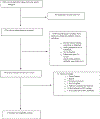HIV testing barriers and intervention strategies among men, transgender women, female sex workers and incarcerated persons in the Caribbean: a systematic review
- PMID: 31506346
- PMCID: PMC7062576
- DOI: 10.1136/sextrans-2018-053932
HIV testing barriers and intervention strategies among men, transgender women, female sex workers and incarcerated persons in the Caribbean: a systematic review
Abstract
Background: This systematic review summarises evidence on the HIV testing barriers and intervention strategies among Caribbean populations and provides pertinent implications for future research endeavours designed to increase rates of HIV testing in the region.
Methods: We used a systematic approach to survey all literature published between January 2008 and November 2018 using four electronic databases (MEDLINE/PubMed, Embase, Web of Science and Global Health). Only peer-reviewed articles published in English that examined HIV testing uptake and interventions in the Caribbean with men, men who have sex with men, female sex workers, transgender women and incarcerated individuals were included.
Results: Twenty-one studies met the inclusion criteria. Lack of confidentiality, access to testing sites, stigma, discrimination, poverty and low HIV risk perception were identified as key barriers to HIV testing. These barriers often contributed to late HIV testing and were associated with delayed treatment initiation and decreased survival rate. Intervention strategies to address these barriers included offering rapid HIV testing at clinics and HIV testing outreach by trained providers and peers.
Conclusion: HIV testing rates remain unacceptably low across the Caribbean for several reasons, including stigma and discrimination. Future HIV testing interventions should target places where at-risk populations congregate, train laypersons to conduct rapid tests and consider using oral fluid HIV self-testing, which allows individuals to test at home.
Keywords: Barriers; Caribbean; HIV; Key Populations; Systematic Review; Testing.
© Author(s) (or their employer(s)) 2020. No commercial re-use. See rights and permissions. Published by BMJ.
Conflict of interest statement
Competing interests: None declared.
Figures
Similar articles
-
Barriers and facilitators to HIV testing among young men who have sex with men and transgender women in Kingston, Jamaica: a qualitative study.J Int AIDS Soc. 2017 Apr 4;20(1):21385. doi: 10.7448/IAS.20.1.21385. J Int AIDS Soc. 2017. PMID: 28406274 Free PMC article.
-
HIV Self-Testing Uptake and Intervention Strategies Among Men in Sub-Saharan Africa: A Systematic Review.Front Public Health. 2021 Feb 19;9:594298. doi: 10.3389/fpubh.2021.594298. eCollection 2021. Front Public Health. 2021. PMID: 33681120 Free PMC article.
-
"We are not gays… don't tell me those things": engaging 'hidden' men who have sex with men and transgender women in HIV prevention in Myanmar.BMC Public Health. 2019 Jan 14;19(1):63. doi: 10.1186/s12889-018-6351-3. BMC Public Health. 2019. PMID: 30642303 Free PMC article.
-
Experiences of gender-based violence among female sex workers, men who have sex with men, and transgender women in Latin America and the Caribbean: a qualitative study to inform HIV programming.BMC Int Health Hum Rights. 2019 Mar 5;19(1):9. doi: 10.1186/s12914-019-0187-5. BMC Int Health Hum Rights. 2019. PMID: 30832664 Free PMC article.
-
Using Digital Communication Technology to Increase HIV Testing Among Men Who Have Sex With Men and Transgender Women: Systematic Review and Meta-Analysis.J Med Internet Res. 2020 Jul 28;22(7):e14230. doi: 10.2196/14230. J Med Internet Res. 2020. PMID: 32720902 Free PMC article.
Cited by
-
The Association Between HIV-Related Stigma and the Uptake of HIV Testing and ART Among Older Adults in Rural South Africa: Findings from the HAALSI Cohort Study.AIDS Behav. 2024 Mar;28(3):1104-1121. doi: 10.1007/s10461-023-04222-w. Epub 2024 Jan 29. AIDS Behav. 2024. PMID: 38286975 Free PMC article.
-
A Scoping Review of Patient Preferences for HIV Self-Testing Services in the United States: Implications for Harm Reduction.Patient Prefer Adherence. 2020 Dec 2;14:2365-2375. doi: 10.2147/PPA.S251677. eCollection 2020. Patient Prefer Adherence. 2020. PMID: 33293799 Free PMC article.
-
HIV treatment cascade among female sex workers in Ethiopia: Assessment against the UNAIDS 90-90-90 targets.PLoS One. 2023 Dec 13;18(12):e0294991. doi: 10.1371/journal.pone.0294991. eCollection 2023. PLoS One. 2023. PMID: 38091300 Free PMC article.
-
Homeless Shelters: HIV Testing During the Atlanta Tuberculosis Outbreak (2008-2018).Am J Public Health. 2022 Jun;112(6):881-885. doi: 10.2105/AJPH.2022.306801. Epub 2022 Apr 14. Am J Public Health. 2022. PMID: 35420895 Free PMC article.
-
Community-based HIV testing in The Netherlands: experiences of lay providers and end users at a rapid HIV test checkpoint.AIDS Res Ther. 2021 Jun 23;18(1):34. doi: 10.1186/s12981-021-00357-9. AIDS Res Ther. 2021. PMID: 34162401 Free PMC article.
References
-
- Avert. Hiv and AIDS in Latin America the Caribbean regional overview, 2018. Available: https://www.avert.org/professionals/hiv-around-world/latin-america/overview
-
- Magno L, Silva LAVda, Veras MA, et al. Stigma and discrimination related to gender identity and vulnerability to HIV/AIDS among transgender women: a systematic review. Cad Saude Publica 2019;35:e00112718. - PubMed
-
- Mendos LR. International Lesbian, gay, bisexual, trans and intersex association: State-Sponsored homophobia. ILGA; Geneva; 2019: 1–196.
Publication types
MeSH terms
Grants and funding
LinkOut - more resources
Full Text Sources
Medical
Miscellaneous

